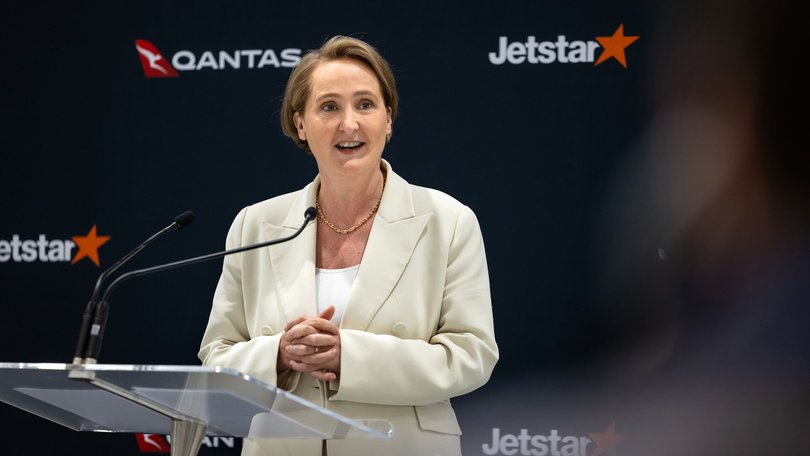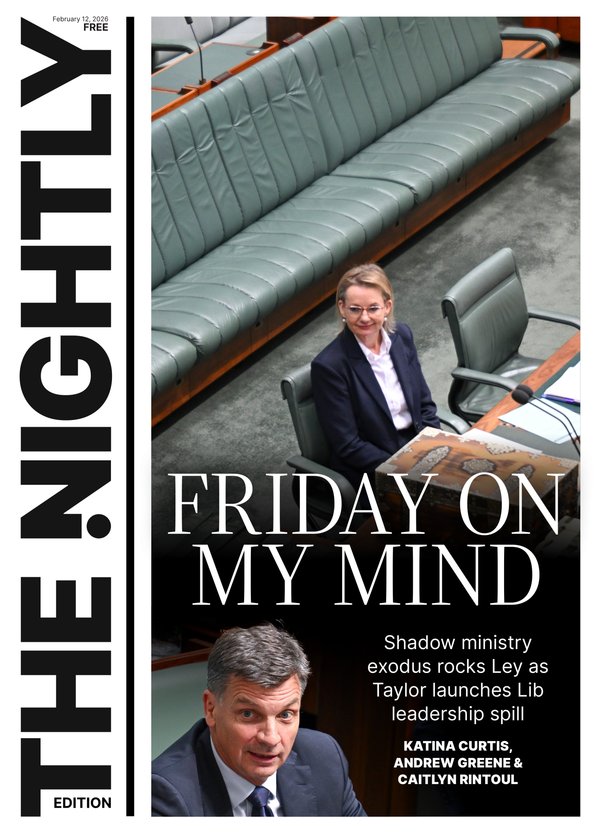ASX recap: All the latest news from company reporting season on the Australian market
Australia’s stock market set an “unprecedented” sixth straight day of record highs on the back of a strong start to earning season led by the major banks.

We have arrived, the first monster week of reporting season.
The heavy-hitters are out this week - NAB, BlueScope Steel, Ampol, CSL, BHP, Monadelphous, Woodside Energy, Iluka Resources; Northern Star Resources, Super Retail Group and Bega Cheese.
Announcing quarterly results on Monday, NAB flagged a 4.5 per cent increase in this financial year’s operating expenses to meet “further payroll issues” identified by the review.
The probe was launched in 2019 to initially look into how 730 NAB employees were short-changed about $850,000, but it has since exposed widespread underpayments across the bank that have already cost it hundreds of millions of dollars.
NAB’s results for the three months to June 30 showed the still growing underpayments problem contributed to a flat cash profit of $1.8 billion for the period, lower than its first-half average.
Meanwhile, Qantas was hit with a landmark $90 million fine for illegally sacking more than 1800 ground workers five years ago, after a Federal Court judge expressed the airline had shown the “wrong kind of sorry”.
Justice Michael Lee ordered Qantas to pay $50m to the Transport Workers Union — which brought the case — saying it “would facilitate and promote” unions to take on similar cases where the Fair Work Ombudsman fails to act.
In a statement, Qantas said the company accepted the penalty and judgement which held it “accountable for our actions that caused real harm to our employees”.
Australia’s stock market set an “unprecedented” sixth straight day of record highs on the back of a strong start to earning season led by the major banks, AAP reported.
Key events
18 Aug 2025 - 12:49 PM
Aussies more anxious on Trump tariffs than China
18 Aug 2025 - 11:20 AM
REA picks new boss
18 Aug 2025 - 11:13 AM
Why are WA retirees being denied credit cards by the banks?
18 Aug 2025 - 11:11 AM
$90m fine ‘holds us accountable’: Qantas
18 Aug 2025 - 10:37 AM
Qantas cops court rebuke, $90m fine over 1800 sacked workers
18 Aug 2025 - 10:35 AM
Investors running after slow start on ASX, then ...
18 Aug 2025 - 10:28 AM
Google cops $55m fine for search engine deals on phones
18 Aug 2025 - 09:45 AM
Aussie rail giant slashes 200 jobs
18 Aug 2025 - 08:39 AM
Wary investors showing Monday blues
18 Aug 2025 - 08:16 AM
Global steel glut smashes BlueScope Steel profit
18 Aug 2025 - 07:10 AM
A2 Milk to buy NZ formula plant to target China growth
18 Aug 2025 - 07:04 AM
NAB profit flat, flags payroll hit
A2 Milk to buy NZ formula plant to target China growth
A2 Milk Co. has agreed to buy a New Zealand infant formula plant as it targets more growth in China.
The company will purchase Yashili New Zealand Dairy’s factory at Pokeno, south of Auckland, for $NZ282 million ($257m). It plans to invest about $NZ100m to increase capacity at the plant, which already holds licences to sell formula in China.
The transaction provides direct ownership of a plant that already makes some a2 products, and an alternative to reliance on manufacturing agreements with Synlait Milk, which will continue. A2 is separately selling its 75 per cent stake in Mataura Valley Milk for $NZ100m and subject to completion of both deals it intends to pay a $NZ300m special dividend.
“The transactions enable the company to build a better, higher growth, lower risk, end-to-end business and deliver substantial benefits to shareholders,” said chief executive David Bortolussi.
A2 today reported a 21 per cent increase in net income to $NZ202.9m for the year ended June 30, slightly ahead of analysts’ average estimates. Revenue climbed 14 per cent to a record $NZ1.9 billion and the company declared a second-half dividend of 11.5c a share.
The company increased its share of the Chinese infant formula market by growing sales even as the overall market reduced, and is now the second-largest seller of English-label product in that market, it said.
While the overall Chinese market shrank, the decline was a third of the pace of the previous year amid signs of increased newborns, a2 said. That puts the company on track to achieve $NZ2b sales of in the 2027 full year, it said.
The company forecasts high single-digit percent increase in revenue in the 2026 full year, which will generate net income “similar” to the $NZ203m it reported today.
Bloomberg
NAB profit flat, flags payroll hit
National Australia Bank’s third-quarter profit was flat as lending to businesses offset growth in expenses.
Unaudited cash earnings came in at $1.8 billion in the three months to June 30, the bank reported today. It now expects operating expenses growth of about 4.5 per cent, which includes fixing a payrolls problem.
“We remain optimistic about the outlook and are well placed to manage NAB for the long term,” chief executive Andrew Irvine said.
Earnings season for Australian lenders has underscored bright spots in loan growth at Westpac, while some analysts said larger rival Commonwealth Bank of Australia now faces a margin squeeze and increasing credit costs in 2026.
The Australian economy is contending with an expected further decrease to benchmark lending rates just as many households struggle with higher energy and other living costs.
Bloomberg
Mixed end to US markets last week
The blue-chip Dow Jones ended higher on Friday after hitting an intraday record high, as UnitedHealth’s shares jumped after Berkshire Hathaway raised its stake, but other Wall Street indexes slipped as mixed data clouded the Federal Reserve’s next monetary policy move.
A meeting between US President Donald Trump and Russian counterpart Vladimir Putin was also on the radar, with markets hoping it could pave the way for a resolution to the Ukraine conflict and determine the outlook for crude prices.
The two leaders held a meeting in Alaska on Friday.
UnitedHealth Group rose almost 12 per cent, its biggest single-day percentage rise since March 2020, after Warren Buffett’s company revealed a new investment in the health insurer, while Michael Burry’s Scion Asset Management also turned more bullish on the company.
Rising costs in the broader healthcare sector and about a 40 per cent slump in UnitedHealth’s shares this year have left the Dow lagging its Wall Street peers on the road to record highs.
Read the full market wrap here.
Originally published on The West Australian
